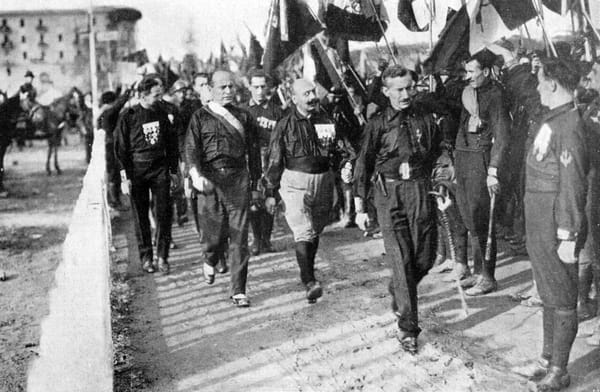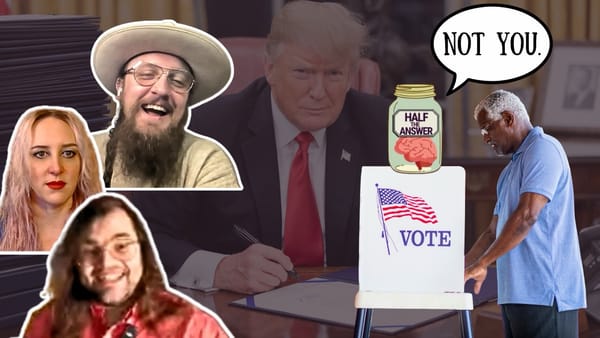Degenerate Nation: RFK Jr’s Far-Right Disease Prevention
RFK Jr.'s anti-vaccine agenda is of a piece with Trump's nativist, Darwinian politics.

Secretary Robert F. Kennedy, Jr. has announced the cancellation of mRNA vaccine research funding by DHS. It’s a move that is as outrageous as it is predictable for the famous anti-vaccine activist and conspiracy theorist. Senator Cassidy, the Louisiana Republican and gastroenterologist who made a show of his uncertainty about Kennedy during his confirmation process, has said that the decision undercuts President Trump’s goal to “Make America healthy again.” But Kennedy’s public health agenda is, in my view, not really a contradiction of the Trumpist and MAGA agenda—a nativist, Darwinian politics that views the nation as something to be purified by struggle and force.
It’s impossible to disentangle the position of either Kennedy or the wider anti-vaccine movement from the central claim that has advanced vaccine hesitancy in the 21st century: that vaccines can cause autism in children. This is certainly Kennedy’s position, having stated even within the last few years, “I do believe that autism does come from vaccines.”
It’s a preposterous assertion, one that has now been rehashed in numerous essays, books, and documentary specials. But the claim, stemming from a now-retracted 1998 article in The Lancet, remains the most important entry point for understanding both RFK’s politics and the convergence of the anti-vaccine movement with MAGA.
There are two important lines of thought at work here, both of which echo eugenicist and fascist thinking around medical science. One is the belief that autism renders a person less valuable, less human.
Kennedy describes life with autism as a desolate thing, cut off from the sort of activities he clearly views as necessary for communion with society. In describing children with autism, he has said, “These are kids who will never throw a baseball, they’ll never go out and date. They’ll never write a poem. They’ll never pay taxes.”
It’s important to stress that these assertions are simply untrue. Many people with Autism Spectrum Disorder go on to do every single one of these activities. There are a wide range of experiences associated with ASD, and no one person lives with it in the exact same way as another. Yet it’s also crucial to understand the darker implication of Kennedy’s words. He’s clearly saying that dating, making art, and being economically productive are what full persons do. So what are we to make—ethically, politically, spiritually—of those who are in one way or another prohibited from such activities? We should note here that a great many ailments, accidents, and conditions can restrict a person’s ability to do any of the above. None of these should, in a free and fair society, dehumanize them.
In essence, Kennedy and other anti-vaccine advocates see autism as a form of degeneracy which reduces both the quality and value of the life led by the afflicted. They are outside the boundary of normal, healthy human life and experience, people to be pitied but also reviled.
In Edith Sheffer’s history of Hans Asperger’s work with autistic children in Nazi Vienna, she highlights how prevailing ideas about sociability and Nazi preoccupations with the strength of the collective colored Asperger’s approach to the children he studied. His support for the sterilization of people with autism was inextricable from the view that they could not live up to the ideals of fellow-feeling and national service promoted by the Nazi state.
In the Nazi worldview, people with mental illnesses or other disabilities were not simply a danger to themselves or their immediate families but to the entire nation. The Nazi concept of entartung, or “degeneracy,” was about maintaining the stability and vitality of the German people as a whole. Charlie English’s The Gallery of Miracles and Madness is a masterful history that captures the collision of Hitler’s obsession with eradicating “degenerate” art and the Nazi program for eliminating the mentally ill. In it, English stresses that such degenerates were portrayed as "degrading [to] the Germans culturally and biologically."
This brings me to the second key element of Kennedy’s anti-vaccine position. It is undeniably a view of autism as degeneracy and, crucially, of any form of “degeneracy” as necessarily contagious. If a person can contract autism from a vaccine that means, simply, that they can be “given” this ostensibly life-destroying condition.
This thinking is in parallel with Trump’s repeated rhetoric describing immigrants as “poisoning the blood” of the country. Both Trump’s noted germaphobia and nativism and Kennedy’s anti-vaccine activism map onto fascism's eugenicist tradition of using national hygiene as a frame for politics. The president regularly makes recourse to “dirtiness” as a means of attacking minorities, foreigners, and countries whose populations he sees as inferior. Last year, Trump told Hugh Hewitt that a person being a murderer is “in their genes” before fretting that “we got a lot of bad genes in our country right now.” The MAGA view is clearly that people have ascertainable, quantifiable worth and that this can be purified or diluted by separation from or contact with contaminants.
Kennedy’s vaccine conspiracism is not separate and apart from the logic that drives other aspects of Trumpism. Just as immigrants can threaten to invade and undermine a nation, rendering it weak and diseased, so too can a vaccine inject a form of degeneracy into a previously healthy child. And just as in the past, the real degenerates are the ones running the show.
Featured image is Dr. Hans Asperger, from the Medical University of Vienna/Josephinum




